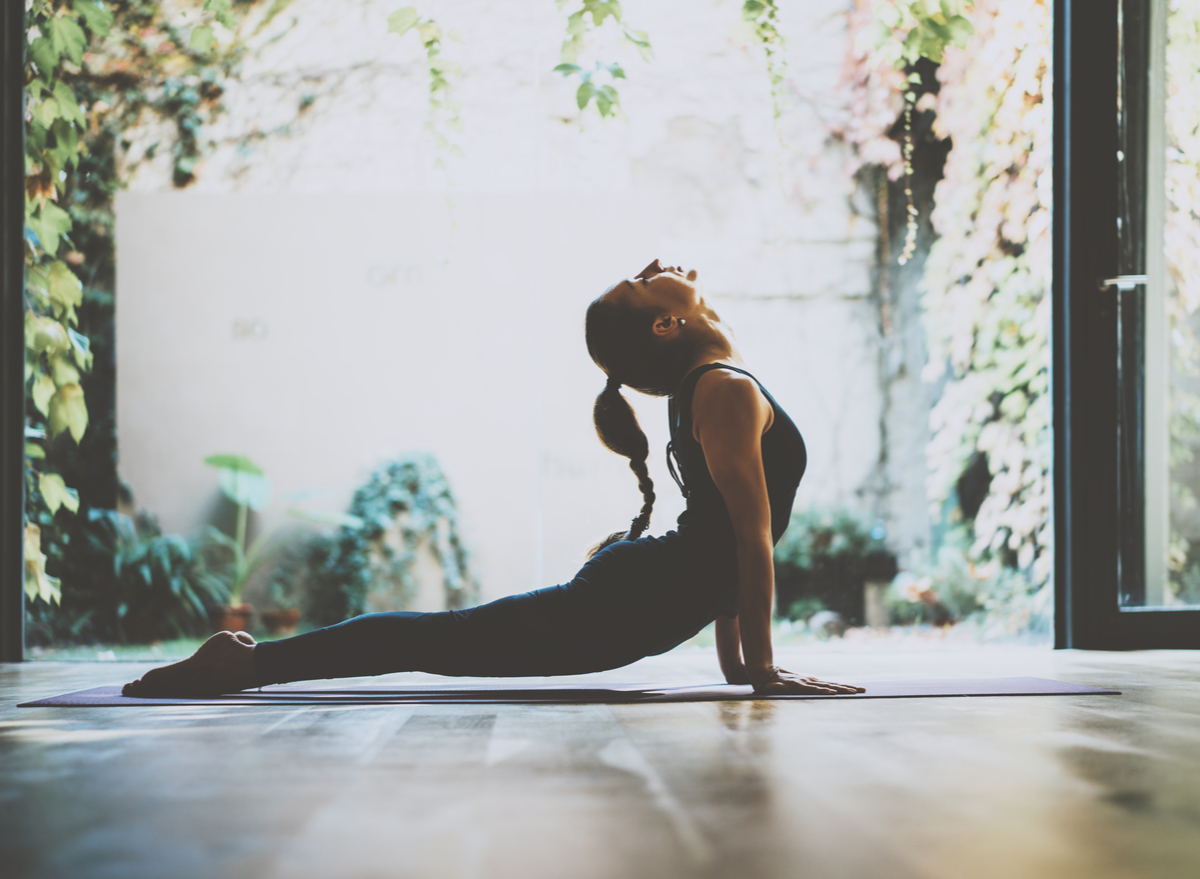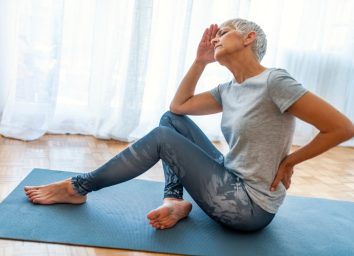5 Major Improvements You'll See From Doing Yoga Every Day, Says Science

It's safe to say at this point that yoga is more than a flash in the wellness pan or yet another fleeting fitness fad. After all, this ancient practice combining precise physical poses, deep breathing, and mental focus dates back over 5,000 years! If people have been practicing yoga for that long, there must be something to it.
One of the biggest factors separating yoga from other physical endeavors is that it's much more than a simple exercise or stretching routine. In fact, yoga is just as much a philosophy as it is a workout. At the core of yoga's message is the idea that body, mind, and spirit are all deeply and irreversibly interconnected. What's good for the body is also good for the spirit and so forth.
There are numerous varieties and "schools" of yoga, with some being far more difficult to perfect than others, but two of the most common variations are called "hatha yoga" and "vinyasa yoga." Usually recommended for beginners, hatha yoga is performed at a slow, deliberate pace and is a great way to acclimate oneself to basic yoga poses. Vinyasa yoga, on the other hand, moves at a faster pace and prioritizes harmonizing breathing and movement.
Many may be hesitant to try yoga for any number of reasons. Some are intimidated by the poses, while others may subscribe to the antiquated notion that yoga is only embraced by hippies and soccer moms. In reality, yoga is becoming more popular by the day. According to the National Institutes of Health, one in seven American adults practiced yoga in 2017! Yoga is well worth a try and offers benefits for anyone and everyone.
So what can a regular yoga regimen do for you? Read on to learn more about the secret effects of doing yoga every day! And next, don't miss Secret Tricks for Getting a Lean Body After 40.
Heart help

The cardiovascular and heart-related benefits of more traditional forms of exercise like jogging and weightlifting are well-documented. You may be surprised to learn, though, that a daily yoga habit can also translate to major heart health benefits.
This research, presented by the European Society of Cardiology, concludes that a regular yoga routine can significantly relieve AFib symptoms. AFib, or atrial fibrillation, is considered the most common form of heart arrhythmia and is characterized by an irregular heartbeat, fatigue, chest pain, and an increased risk of even more serious heart events including heart attack and stroke. Over the course of a 12-week yoga program, over 500 AFib patients saw both symptom occurrence and severity improve significantly. Even better, many heart patients also enjoyed a notable reduction in blood pressure.
"A large number of studies show that yoga benefits many aspects of cardiovascular health," Hugh Calkins, M.D., director of the Cardiac Arrhythmia Service at Johns Hopkins, explained to Hopkins Medicine. "There's been a major shift in the last five years or so in the number of cardiologists and other professionals recognizing that these benefits are real."
Related: Sign up for our newsletter for the latest Mind + Body news!
Do away with depression

Depression is an incredibly complex condition, and we know by now that there is no single panacea that's going to put a smile on everyone's face. That being said, there is scientific reason to believe that yoga promotes positivity and can assist in treating and alleviating depression.
One study published in the Journal of Alternative and Complementary Medicine gathered together a group of 30 adults diagnosed with major depressive disorder (MDD) and instructed half to participate in either yoga or deep breathing classes seven days per week for a total of 12 weeks or to attend yoga/breathing classes five days per week for the same period.
"Think of it this way, we give medications in different doses in order to enact their effects on the body to varying degrees. Here, we explored the same concept, but used yoga," explains corresponding study author Chris Streeter, MD, an associate professor of psychiatry at Boston University. "We call that a dosing study. Past yoga and depression studies have not really delved deeply into this."
After just a single month, participants in both groups reported feeling much more positive, less depressive feelings, less anxiety, more tranquility, and improved sleep quality. Those who practiced more yoga were more likely to enjoy greater relief, but even the "low dose" yoga group experienced notable depression alleviation.
"The practical findings for this integrative health intervention is that it worked for participants who were both on and off antidepressant medications, and for those time-pressed, the two times per week dose also performed well," says The Journal of Alternative and Complementary Medicine Editor-in-Chief John Weeks.
Back pain relief

An aching back is perhaps one of the most common complaints as one grows older, but yoga can help ease back pain as well. This research published in the Annals of Internal Medicine even reports a 12-week yoga course was just as helpful in terms of easing chronic back pain and improving function as 15 visits to a physical therapist! Moreover, the yoga students were still enjoying less back pain a full year afterward!
Meanwhile, another study released in the Cochrane Library came to similar conclusions after analyzing 12 relevant prior projects encompassing over 1,000 people. Study authors determined that roughly six months of yoga can potentially help improve back function and provide at least some back pain relief after just three months.
"We found that the practice of yoga was linked to pain relief and improvement in function," comments lead study author, L. Susan Wieland, PhD, MPH, Assistant Professor of Family & Community Medicine at the University of Maryland School of Medicine, and Coordinator of the Cochrane Complementary Medicine Field at the Center for Integrative Medicine at UM SOM. "For some patients suffering from chronic non-specific low back pain, yoga may be worth considering as a form of treatment."
Related: How Yoga Can Help You Lose Weight, According to Science
Stop stress & anxiety

If you've been feeling particularly on edge or anxious lately, yoga may be a great way to calm those nerves and finally find elusive relaxation.
"There's no denying that exercise is good for mental health, research shows that yoga has both instant and long-term benefits on reducing anxiety and stress," explains NASM-certified PT Joshua Lafond, founder and editor at HealthyGymHabits. "Since this is the case, I always try to incorporate a yoga pose at the end of every client's workout. I know what you're thinking, yes I will even do this with my macho clients after their heavy weight lifting workouts."
Speaking of research, consider the findings of this study published in JAMA Psychiatry. Scientists conclude yoga is quite effective at treating various anxiety disorders, even more so than standard stress relief courses.
"Generalized anxiety disorder is a very common condition, yet many are not willing or able to access evidence-based treatments," notes lead study author & NYU professor Naomi M. Simon. "Our findings demonstrate that yoga, which is safe and widely available, can improve symptoms for some people with this disorder and could be a valuable tool in an overall treatment plan."
Related: This 25-Minute Walking Workout That Will Get You Toned
Major brain boost

Besides yoga's potential mental health benefits, emerging research also suggests a habitual yoga routine can benefit the brain, boost thinking skills, and even prevent cognitive decline. This study released in Brain Plasticity indicates yoga is just as helpful to the mind as aerobic exercise. According to the work, both the hippocampus (responsible for memory) and amygdala (responsible for emotional regulation) tend to be larger among yoga practitioners.
That's not all, either: The prefrontal cortex is larger among people who practice yoga as well. "The prefrontal cortex, a brain region just behind the forehead, is essential to planning, decision-making, multitasking, thinking about your options, and picking the right option," says study leader and Wayne State University psychology professor Jessica Damoiseaux.
For more, check out 3 Major Secrets to Living to 99, According to Betty White.








